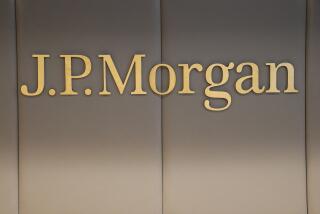Schwab says it won’t settle
- Share via
In a rare move, Charles Schwab Corp. has pulled out of a deal to pay $235 million to investors in a once-popular bond fund that suffered steep mortgage-related losses.
Lawyers for the investors said they would ask the court to hold Schwab in contempt for trying to withdraw from the agreement.
Schwab agreed in April to make the payments under a proposed settlement of a class-action lawsuit brought by 250,000 individual investors who alleged they lost as much as $800 million in Schwab’s YieldPlus fund.
But the San Francisco brokerage said Monday that it was scuttling the deal, which had not yet received court approval, after investor attorneys argued it would apply only to Californians, leaving the lawyers free to bring additional cases on behalf of out-of-state plaintiffs under California law.
The company said it had entered the accord believing it would apply regardless of where an investor lived.
“Schwab agreed to a generous settlement, but only in return for an end to all litigation over the facts and claims alleged in the consolidated complaints,” the company said in a statement. “Now that plaintiffs have asserted that Schwab is not entitled to the primary benefit Schwab was to receive under the settlement, Schwab has no choice but to withdraw.”
Schwab said it looked forward to contesting the class action at trial.
The law firm representing plaintiffs in the suit expressed surprise at Schwab’s announcement and promised to ask the federal court handling the case in San Francisco to hold the company in contempt “for their effort to rewrite a deal they negotiated and signed.”
“Schwab and their counsel are a sophisticated group,” the law firm, Seattle-based Hagens Berman Sobol Shapiro, said in a statement. “The notion that they can walk away from the agreement because they now realize they won’t get complete amnesty is farfetched.”
Some investors already had gotten letters from Schwab spelling out how much they would receive under the settlement and were making plans for the money, said Sam Edwards, a Houston attorney who has represented YieldPlus investors.
“There are going to be some furious people,” Edwards said.
It’s extremely unusual for settlements to fall apart at the eleventh hour, because companies normally are reluctant to take their chances in court, where they run the risk of a much larger judgment against them, legal experts said.
Jacob Frenkel, a former Securities and Exchange Commission lawyer now in private practice, expressed doubt about the reason Schwab gave for backing out of the deal. The question of which investors would be covered by a settlement is typically resolved early on, he said.
Schwab’s rationale is “almost like ‘I bought a red sweater at Macy’s and then discovered I couldn’t return it to Nordstrom.’ The explanation doesn’t add up,” Frenkel said. “There likely is something significant missing” from Schwab’s stated reasoning.
But Schwab spokesman Greg Gable said the company indeed thought the issue had been clearly resolved. In fact, he said, Schwab rejected an effort by the plaintiffs’ attorneys to add language to the settlement agreement preserving the right of out-of-state residents to sue under California law.
The class action alleges, as do dozens of private arbitration cases, that Schwab misrepresented the risks of the supposedly conservative YieldPlus fund, primarily by stuffing it with dangerous mortgage-backed securities that plunged in value as defaults surged and the housing market crashed.
Schwab has said the YieldPlus losses were caused by the unexpected convulsion of the credit markets during the global financial crisis.
Schwab once pitched YieldPlus, a so-called ultra-short-term bond fund, as a safe but higher-yielding alternative to money market funds, and its assets ballooned to more than $12 billion by mid-2007.
The fund lost 35.4% in 2008 followed by a 10.5% decline in 2009, according to Morningstar Inc. Investors stampeded out of the fund, which at last count had only $154 million in assets. It has lost 0.4% this year.
nathaniel.popper@latimes.com
More to Read
Inside the business of entertainment
The Wide Shot brings you news, analysis and insights on everything from streaming wars to production — and what it all means for the future.
You may occasionally receive promotional content from the Los Angeles Times.








